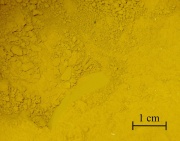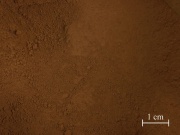Difference between revisions of "Umber"
(username removed) |
|||
| (4 intermediate revisions by 3 users not shown) | |||
| Line 2: | Line 2: | ||
== Description == | == Description == | ||
| − | A natural, brown earth pigment containing [ | + | A natural, brown earth pigment containing [[ferric%20hydroxide|iron hydroxide]] and [[manganese%20dioxide|manganese dioxide]]. The name umber was originally used for the deposits found near the Italian city of Umbria. High quality deposits were also found in Cyprus and were sold as Cyprus umber and Turkey umber. Unprocessed, or [[raw%20umber|raw umber]], is a pale yellowish brown. [[Burnt%20umber|Burnt umber]] is made by roasting the raw earth to convert the iron hydroxides to iron oxides which produces a dark brown pigment with a reddish tone. Both pigments have good hiding power but burnt umber is more transparent than raw umber. Umber is a permanent pigment that is used with both oil and watercolor paints. It is also used in lithographic inks and wallpaper. |
[[File:Burnt.umber.powder_det.jpg|thumb|Burnt umber]] | [[File:Burnt.umber.powder_det.jpg|thumb|Burnt umber]] | ||
| Line 9: | Line 9: | ||
raw umber; burnt umber; Cyprus umber; Turkey umber; Turkey brown; umbra; Umbra (Deut.); terre d'ombre (Fr.); sombra (Esp., Port.); chestnut brown; jacaranda brown, euchrome; Sicilian brown; Vandyke umber; Caledonian brown; Cappagh brown | raw umber; burnt umber; Cyprus umber; Turkey umber; Turkey brown; umbra; Umbra (Deut.); terre d'ombre (Fr.); sombra (Esp., Port.); chestnut brown; jacaranda brown, euchrome; Sicilian brown; Vandyke umber; Caledonian brown; Cappagh brown | ||
| + | ==Physical and Chemical Properties== | ||
{| class="wikitable" | {| class="wikitable" | ||
|- | |- | ||
! scope="row"| Density | ! scope="row"| Density | ||
| − | | 3.2-3.6 | + | | 3.2-3.6 g/ml |
|} | |} | ||
| − | == | + | == Resources and Citations== |
| − | * | + | * Ralph Mayer, ''A Dictionary of Art Terms and Techniques'', Harper and Row Publishers, New York, 1969 (also 1945 printing) |
| − | * | + | * R.D. Harley, ''Artists' Pigments c. 1600-1835'', Butterworth Scientific, London, 1982 |
| − | * | + | * Pigments Through the Ages - http://webexhibits.org/pigments/indiv/overview/umbra.html |
* ''Paint in America'', Robert Moss (ed.), John Wiley & Sons, New York, 1994 Comment: M.Mosca, "Paint Decoration at Mount Vernon" | * ''Paint in America'', Robert Moss (ed.), John Wiley & Sons, New York, 1994 Comment: M.Mosca, "Paint Decoration at Mount Vernon" | ||
| − | * | + | * G.S.Brady, ''Materials Handbook'', McGraw-Hill Book Co., New York, 1971 Comment: p. 558 |
| − | * | + | * Richard S. Lewis, ''Hawley's Condensed Chemical Dictionary'', Van Nostrand Reinhold, New York, 10th ed., 1993 |
| − | * | + | * Matt Roberts, Don Etherington, ''Bookbinding and the Conservation of Books: a Dictionary of Descriptive Terminology'', U.S. Government Printing Office, Washington DC, 1982 |
| − | * | + | * Susan E. Schur, Conservation Terminology: A review of Past & Current Nomenclature of Materials, ''Technology and Conservation'', Spring (p.34-39); Summer (p.35-38); Fall (p.25-36), 1985 |
| − | * | + | * Random House, ''Webster's Encyclopedic Unabridged Dictionary of the English Language'', Grammercy Book, New York, 1997 |
* ''The American Heritage Dictionary'' or ''Encarta'', via Microsoft Bookshelf 98, Microsoft Corp., 1998 | * ''The American Heritage Dictionary'' or ''Encarta'', via Microsoft Bookshelf 98, Microsoft Corp., 1998 | ||
Latest revision as of 10:13, 23 June 2022
Description
A natural, brown earth pigment containing iron hydroxide and Manganese dioxide. The name umber was originally used for the deposits found near the Italian city of Umbria. High quality deposits were also found in Cyprus and were sold as Cyprus umber and Turkey umber. Unprocessed, or Raw umber, is a pale yellowish brown. Burnt umber is made by roasting the raw earth to convert the iron hydroxides to iron oxides which produces a dark brown pigment with a reddish tone. Both pigments have good hiding power but burnt umber is more transparent than raw umber. Umber is a permanent pigment that is used with both oil and watercolor paints. It is also used in lithographic inks and wallpaper.
Synonyms and Related Terms
raw umber; burnt umber; Cyprus umber; Turkey umber; Turkey brown; umbra; Umbra (Deut.); terre d'ombre (Fr.); sombra (Esp., Port.); chestnut brown; jacaranda brown, euchrome; Sicilian brown; Vandyke umber; Caledonian brown; Cappagh brown
Physical and Chemical Properties
| Density | 3.2-3.6 g/ml |
|---|
Resources and Citations
- Ralph Mayer, A Dictionary of Art Terms and Techniques, Harper and Row Publishers, New York, 1969 (also 1945 printing)
- R.D. Harley, Artists' Pigments c. 1600-1835, Butterworth Scientific, London, 1982
- Pigments Through the Ages - http://webexhibits.org/pigments/indiv/overview/umbra.html
- Paint in America, Robert Moss (ed.), John Wiley & Sons, New York, 1994 Comment: M.Mosca, "Paint Decoration at Mount Vernon"
- G.S.Brady, Materials Handbook, McGraw-Hill Book Co., New York, 1971 Comment: p. 558
- Richard S. Lewis, Hawley's Condensed Chemical Dictionary, Van Nostrand Reinhold, New York, 10th ed., 1993
- Matt Roberts, Don Etherington, Bookbinding and the Conservation of Books: a Dictionary of Descriptive Terminology, U.S. Government Printing Office, Washington DC, 1982
- Susan E. Schur, Conservation Terminology: A review of Past & Current Nomenclature of Materials, Technology and Conservation, Spring (p.34-39); Summer (p.35-38); Fall (p.25-36), 1985
- Random House, Webster's Encyclopedic Unabridged Dictionary of the English Language, Grammercy Book, New York, 1997
- The American Heritage Dictionary or Encarta, via Microsoft Bookshelf 98, Microsoft Corp., 1998
- Art and Architecture Thesaurus Online, http://www.getty.edu/research/tools/vocabulary/aat/, J. Paul Getty Trust, Los Angeles, 2000

